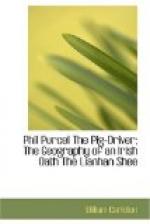’Octavo—One
ditto out of respect for dacent Owen Smith, of
Lisbuy,
1
Now I must make the total amount thirteen, an’ all will be right.”
“Masther, have you a prayer-book widin?—bekase if you have, I may as well swear here, and you can witness it.”
“Katty, hand over the Spiritual Exercises—a book aquil to the Bible itself for piety an’ devotion.”
“Sure they say, Masther, any book that, the name o’ God’s in, is good for an oath. Now, wid the help o’ goodness, repate the words afore me, an’ I’ll sware thim.”
O’Flaherty hemmed two or three times, and complied with Peter’s wishes, who followed him in the words until the oath was concluded. He then kissed the book, and expressed himself much at ease, as well, he said, upon the account of Ellish’s soul, as for the sake of his children.
For some time after this, his oath was the standing jest of the neighborhood: even to this day, Peter Connell’s oath against liquor is a proverb in that part of the country. Immediately after he had sworn, no one could ever perceive that he violated it in the slightest degree; indeed there could be no doubt as to literally fulfilling it. A day never passed in which he did not punctually pay a visit to those whose names wore dotted down, with whom he sat, pulled out his flask, and drank his quantum. In the meantime the poor man was breaking down rapidly; so much so, that his appearance generally excited pity, if not sorrow, among his neighbors. His character became simpler every day, and his intellect evidently more exhausted. The inoffensive humor, for which he had been noted, was also completely on the wane; his eye waxed dim, his step feeble, but the benevolence of his heart never failed him. Many acts of his private generosity are well known, and still remembered with gratitude.
In proportion as the strength of his mind and constitution diminished, so did his capacity for bearing liquor. When he first bound himself by the oath not to exceed the long dozen, such was his vigor, that the effects of thirteen tumblers could scarcely be perceived on him. This state of health, however, did not last. As he wore away, the influence of so much liquor was becoming stronger, until at length he found that it was more than he could bear, that he frequently confounded the names of the men, and the number of tumblers mentioned in the oath, and sometimes took in, in his route, persons and places not to be found in it at all. This grieved him, and he resolved to wait upon O’Flaherty for the purpose of having some means devised of guiding him during his potations.
“Masther,” said he, “we must thry an’ make this oath somethin’ plainer. You see when I get confused, I’m not able to remimber things as I ought. Sometimes, instid o’ one tumbler, I take two at the wrong place; an’ sarra bit o’ me but called in an’ had three wid ould Jack Rogers, that isn’t in it at all. On another day I had a couple wid honest Barney Casey, an my way acrass to Bartle Gorman’s. I’m not what I was, Masther, ahagm; so I’d thank you to dhraw it out more clearer, if you can, nor it was.”




